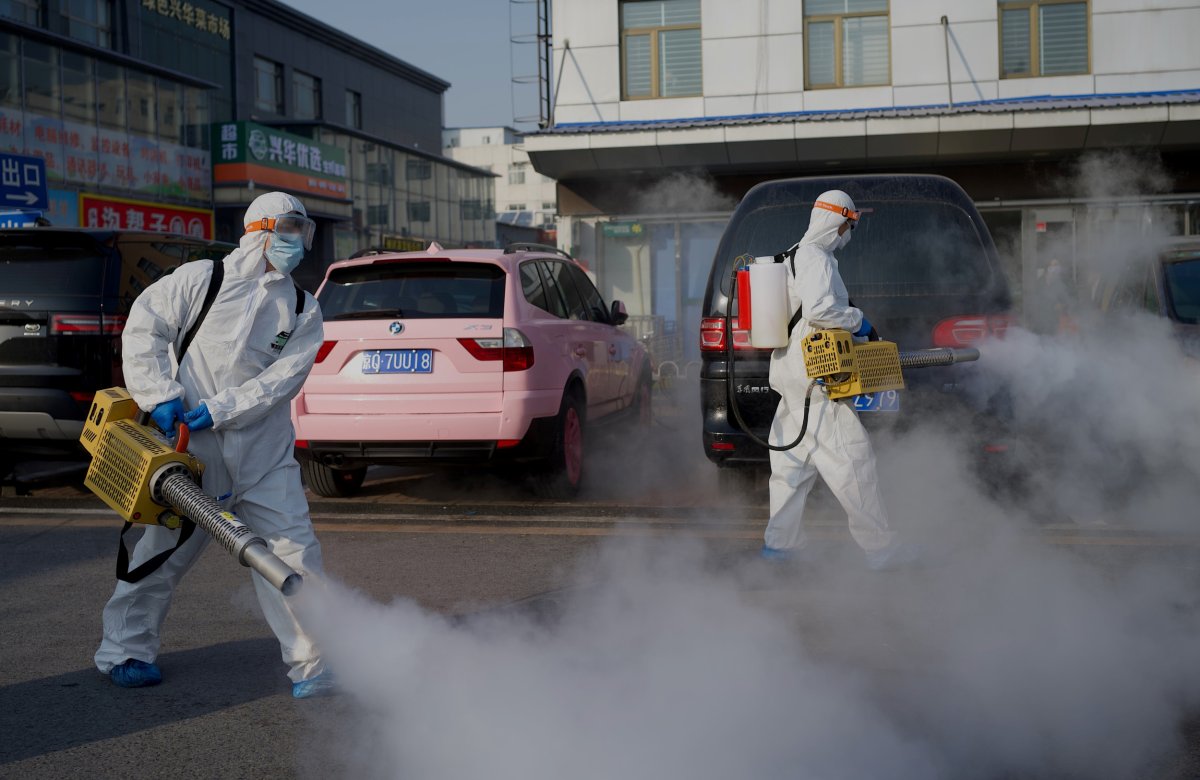Public health workers wearing full protective gear have appeared on the streets of northern China, according to footage on social media, evoking memories of the country's stringent anti-virus measures during the COVID-19 pandemic.
The hazmat-clad personnel were seen spraying disinfectant in public spaces in Sanhe, in China's northern Hebei Province roughly 50 miles east of capital Beijing, according to the poster of the images and video footage. It remains unclear whether this was a local government initiative or central government directive.
The reemergence of the gear, however, has raised speculation about the potential return of pandemic-era restrictions amid a surge of respiratory illnesses, notably among children, which has strained hospitals in the region. The outbreak is being closely watched by the World Health Organization, the agency said last week.
In the past days, China's state-controlled media have reported on hospitals in Beijing, Tianjin and other northern areas operating at maximum capacity. Beijing Children's Hospital alone reported admitting over 7,000 daily cases, one report said.
Patients said they experienced closed outpatient clinics and long lines, some enduring waits of a day or longer at emergency departments.
On Douyin, the Chinese version of the short video-sharing platform TikTok, videos showed disease prevention teams disinfecting a classroom and city streets while dressed from head to toe in hazmat suits.
Termed "dabai," literally "big white [figures]," the hazmat workers became a symbol of China's unpopular "zero-COVID" policies that triggered rare anti-government protests late last year. Their appearance has unsettled observers online.
"Oh, my God. It's almost 2024 and this familiar scene is back!" one netizen wrote on X (formerly Twitter).
"The dabai are here again! Can we really say there won't be [epidemic] controls again?" another responded.
11月24日河北三河市
— 李老师不是你老师 (@whyyoutouzhele) November 26, 2023
由于近期支原体肺炎等流感疾病横行,三河市应急救援中心组织人员,身穿大白防护服进入校园展开消杀工作。 pic.twitter.com/lEz00OHzHq
The public's memory of the workers included their strict enforcement of anti-virus policies, such as involuntary quarantine at home, the forced removal of suspected cases from their homes, and—in a number of high-profile incidents—the killing of pets or stray animals.
The trauma in the public's consciousness was such that a few individuals chose a dabai costume for Shanghai's recent Halloween parade.
Newsweek couldn't independently verify the authenticity of footage. Sanhe's municipal government and the Chinese Center for Disease Control and Prevention didn't return separate written requests for comment before publication.

It remains unclear how widespread mass disinfection will become in China's flu season. At the height of the pandemic, questioned were raised about the effectiveness of spraying city streets and classrooms to fight SARS-CoV-2, an airborne disease.
However, there is some suggestion Chinese citizens are likely to adopt extra precautions. A Beijing-based reporter for The Associated Press captured one commuter wearing a full protective suit while riding a bus.
Spotted in Beijing the other day. Most people are still going unmasked, but some aren’t messing around when it comes to this new wave of pneumonia. pic.twitter.com/woVSDaj1FQ
— Dake Kang (@dakekang) November 27, 2023
The surge in infections has been attributed by Chinese health authorities to a confluence of typically mild mycoplasma pneumonia, adenovirus and other seasonal illnesses. This surge is exacerbated by children's reduced exposure to these illnesses during lockdown, creating an "immunity gap," the state-backed Global Times newspaper cited respiratory expert Wang Guangfa as saying.
The WHO had been requesting data from China about the clusters of infections, including epidemiological and clinical information and laboratory results. The global health body has said that it does not recommend any specific measures for anyone traveling to China at this time.
China's National Health Commission in a press conference on Sunday stressed the wave of infections was "related to the superposition of multiple respiratory pathogens."
Commission spokesperson Mi Feng called on all municipalities to "scientifically coordinate medical resources…implement a hierarchical diagnosis and treatment system…[and] mobilize forces across departments and hospitals."
Uncommon Knowledge
Newsweek is committed to challenging conventional wisdom and finding connections in the search for common ground.
Newsweek is committed to challenging conventional wisdom and finding connections in the search for common ground.
About the writer
Micah McCartney is a reporter for Newsweek based in Taipei, Taiwan. He covers U.S.-China relations, East Asian and Southeast Asian ... Read more
To read how Newsweek uses AI as a newsroom tool, Click here.





